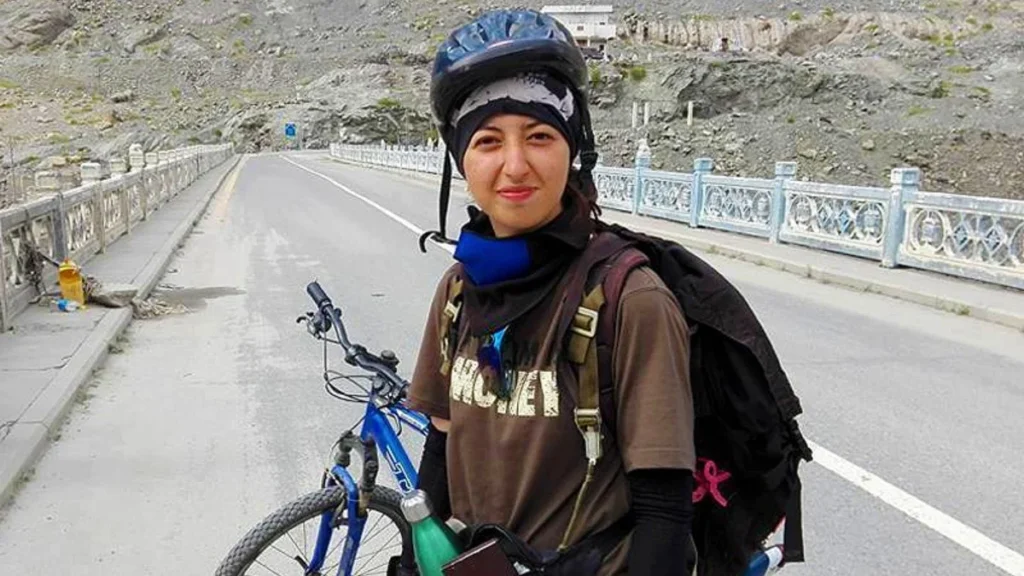Samar Khan has become one of Pakistan’s most visible adventure athletes by turning a love of mountains into headline-making firsts. Born on August 11, 1990, in Khas Dir, Khyber Pakhtunkhwa, she earned a Master’s degree in Applied Physics before discovering that her true laboratory was the open world, a place where motion, friction, and will create balance. From paragliding over ridges to conquering glaciers on a bicycle, Samar transformed the equations of science into the art of survival.
Her introduction to paragliding during university ignited the curiosity that would later evolve into a mission: to defy both literal and social gravity and prove that women from Pakistan’s conservative regions could soar where fear once ruled. “The only motivation which was there, and is still there,” she told The Nation, “Is the mountains, the strength and dominance of nature.”
Breaking Inertia: Early Struggles and Motion
Her early career was a test in real-world physics. Samar bought used gear, learned from online tutorials, and trained alone, turning every fall into a calculation and every climb into an experiment. The laws of motion became metaphors for her life, inertia as resistance from tradition, acceleration as courage gained through adversity. She pedaled against friction not just on rough trails but against a society hesitant to see women in motion. Sponsorships were rare, institutional support almost nonexistent, and media reactions often dismissive. Yet she persisted, proving that when faith applies constant force, even resistance yields. Her journey was an unspoken formula: force multiplied by belief equals progress.
Conquering Peaks: The Chemistry of Courage
In August 2016, Samar solved her own version of Newton’s problem when she became the first woman in the world to cycle on the Biafo Glacier, a 4,500-metre (≈14,760-foot) stretch of shimmering ice in the Karakoram. For ten days, she balanced motion and friction, trusting physics and faith to keep her upright. “To change the mindsets of our people, I chose to cycle on glaciers,” she told Geo News, describing the ride as a way to make Pakistan’s glaciers visible to both scientists and citizens. She then cycled 1,098 kilometers from Islamabad to the Khunjerab Pass, reaching one of the world’s highest paved borders.
In 2017, she pedaled up Mount Kilimanjaro; in 2021, she cycled to K2 Base Camp; and in 2022, she summited a virgin peak of 5,610 metres in Hunza, later named Ghar-e-Samar. In 2024, she scaled Mount Elbrus (5,642 m), Europe’s highest peak, and became the first Pakistani to snowboard down from its summit, carrying the green flag to the top. Most recently, in January 2025, she conquered Mount Aconcagua (6,961 m), South America’s highest peak. “I set out at 3 am and reached the top by 10 am with our flag,” she said after Elbrus. “Then I snowboarded down, a descent that felt like pure freedom.”
Each ascent was chemistry in motion, adrenaline reacting with oxygen to form courage, the atmosphere becoming her laboratory of limits. Unlike athletes who collect medals, Samar collects moments where science meets spirit. She is recognized as a Pride of Pakistan awardee, a WWF Pakistan goodwill ambassador, and an ESPNW Global Sports Mentoring Program alumna with a certification in sports entrepreneurship from Babson College. These distinctions mirror not just sporting milestones but the conversion of energy, the potential energy of dreams transformed into kinetic change.
Resistance and Recalibration
But every equation has its loss factor. Beyond financial strain, Samar has endured harassment, including being groped while cycling, and sexist commentary from sections of the media. “I was harassed and mocked for what I do,” she told Dawn, describing how difficult it was to continue training in public spaces. Such experiences exposed the social drag slowing women’s motion in Pakistan’s public sphere. Yet instead of surrendering, she recalibrated. Pain became pressure; pressure became propulsion. Through interviews in Dawn, The Express Tribune, and The Print, she reframed trauma as data, evidence that cultural friction can either stop or strengthen movement depending on the direction of will.
Legacy of Balance: From Motion to Meaning
Her legacy today operates in two planes, symbolic and practical. Symbolically, Samar Khan represents a new model of Pakistani womanhood: one where velocity, vision, and virtue coexist. Practically, she founded SamarCamp, a training platform that teaches girls mountain biking, snowboarding, and outdoor survival skills. Here, balance is redefined, not the static balance of physics, but the living balance of trust. Each girl learns that equilibrium isn’t the absence of motion; it’s the harmony of courage and control. Samar’s rides often double as campaigns for glacier preservation, environmental awareness, and youth empowerment, merging science and sustainability through motion.
In her world, the cyclist’s body is an engine, fueled by heartbeats, powered by dreams. Every revolution of her pedals is a small defiance of gravity, the opponent she meets daily. Her endurance becomes the equation that defeats it. As she once said, “Mountains teach me humility; they strip you down to your truth.” If future institutions invest in her vision, Pakistan may yet build an ecosystem where adventure sports thrive. Until then, Samar Khan remains her own proof, a living theorem showing that in the physics of faith, balance is born from trust, motion from hope, and friction from the beautiful resistance that turns fear into flight.
Also Read: Inspiring Defiance Against Extremism: How Maria Toorpakai Wazir Redefined Courage



